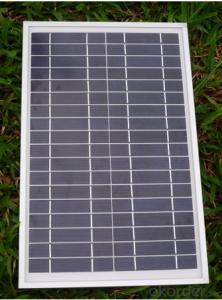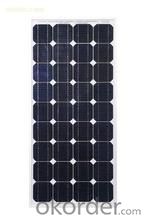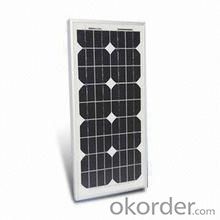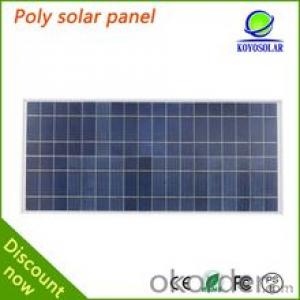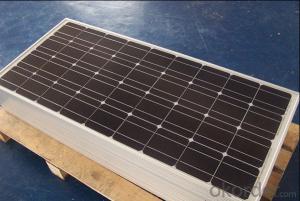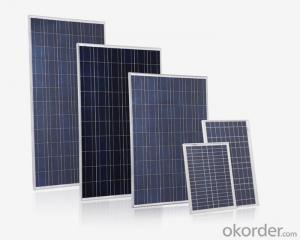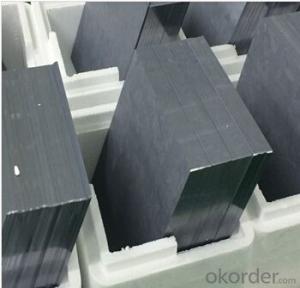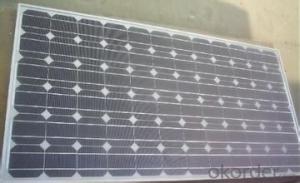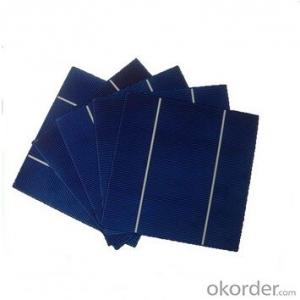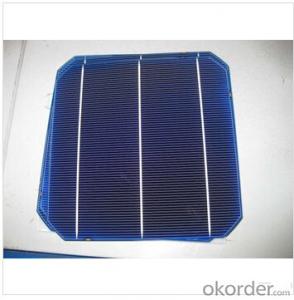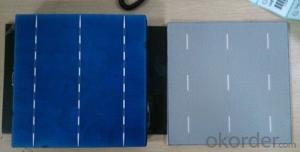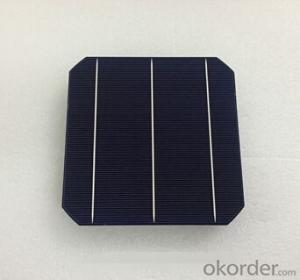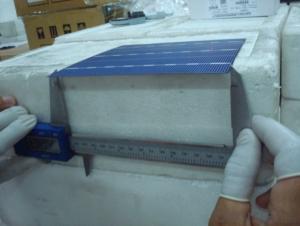6 X 6 Solar Cells 156mm*156mm Monocrystalline Silicon Modules with CE Certificate
- Loading Port:
- Tianjin
- Payment Terms:
- TT OR LC
- Min Order Qty:
- 1000 watt
- Supply Capability:
- 10000 watt/month
OKorder Service Pledge
OKorder Financial Service
You Might Also Like
Introduction
2015 Hot Sale High Efficiency156mm*156mm Monocrystalline silicon modules with TUV CE certificate.
Feather
1.High conversion efficiencies resulting in superior power output performance.
2.Outstanding power output even in low light or high temperature conditions
3.Optimized design for ease of soldering and lamination
characteristic
High effcient with stable quality and competitive price
High output with stable system
20W~25W output under standard conditions
Output Voltage 18V, suitable for 12V power system
Can fully charge up a 12V 7.2AH battery within 4~6 hours
Poly-crystallize Solar Cells from Taiwan or Germany
Product life over 25 years
Resistance to fluctuations of temperature, humidity and strong wind
Manufactured under IEC61215 Solar Photovoltaic Panel requirements
Parameter
size
156mm×156mm±0.5mm
thickness
180µm±20µm and 200µm±20µm
Front design
5 mm bus bars (silver),blue anti-reflection coating(silicon nitride)
Back design
0 mm wide segment soldering pads(silver),back surface field (aluminium)
voc ratio
-0.331%/K
scc
+0.042%/K
output ratio
-0.41%/K
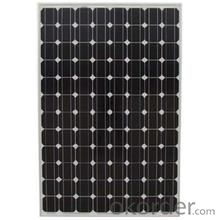
- Q: What is the role of disconnect switches in solar cell systems?
- Disconnect switches in solar cell systems serve as a crucial safety measure by providing a means to isolate the solar panels from the electrical grid. They allow for the safe maintenance, repair, or replacement of solar components without the risk of electrical shock or damage. Additionally, disconnect switches enable efficient troubleshooting and troubleshooting of solar systems by allowing technicians to isolate specific sections of the system for inspection or repair.
- Q: How long does it take to install solar cells on a rooftop?
- The time required to install solar cells on a rooftop can vary depending on various factors such as the size of the system, the complexity of the installation, and the number of installers working on the project. On average, a residential rooftop solar installation can typically take anywhere from one to three days to complete. However, larger commercial or industrial installations may take longer, ranging from a few weeks to several months. It's always best to consult with a professional solar installer who can provide a more accurate estimate based on the specific project requirements.
- Q: What is the effect of shading on solar cell performance?
- Shading has a significant negative effect on solar cell performance as it reduces the amount of sunlight reaching the cell, leading to decreased energy production. Even a small shaded area can cause a significant drop in efficiency, as solar cells are interconnected and operate in series. The shaded portion acts as a barrier, limiting the flow of current and reducing overall power output. Therefore, it is crucial to minimize shading to maximize the performance and efficiency of solar cells.
- Q: Can solar cells be used for outdoor signage?
- Yes, solar cells can be used for outdoor signage. Solar cells are capable of converting sunlight into electricity, which can power the lighting or display systems used in outdoor signage. This allows for an environmentally-friendly and cost-effective solution for outdoor signage, as it eliminates the need for traditional power sources and reduces energy consumption.
- Q: Can solar cells be used for powering hotels?
- Yes, solar cells can be used for powering hotels. Solar cells, also known as photovoltaic cells, convert sunlight into electricity, providing a sustainable and renewable energy source. By installing solar panels on the roofs or in open spaces around hotels, they can generate clean energy to meet a portion or even the entire electricity demand of the establishment, reducing reliance on traditional power sources and resulting in cost savings.
- Q: How are solar cells used in agricultural applications?
- Solar cells are used in agricultural applications to power various farming equipment, such as irrigation systems, pumps, and electric fences. They also provide electricity for lighting and heating in greenhouses and can be used to charge batteries for storing energy to be used during low sunlight periods.
- Q: I am a purchasing manager for a EPC engineering company, and we are planning to purchasing some 4bb solar cells for one of our project in Taiwan, can I get a quotation online?
- We do have 4bb solar cells, but we also have 125Mono &156 Multi&Mono 2BB&3BB&4BB A grade solar cell.
- Q: Can solar cells be used in powering e-bikes?
- Yes, solar cells can be used to power e-bikes. Solar panels can be installed on the e-bike to convert sunlight into electricity, which can then be used to charge the e-bike's battery. This allows for a sustainable and renewable source of energy to power the e-bike, reducing reliance on traditional electricity sources.
- Q: How do solar cells perform in different geographic locations?
- Solar cells perform differently in different geographic locations due to variations in sunlight intensity and weather conditions. Locations closer to the equator typically receive more direct sunlight and have higher solar cell performance, while locations farther from the equator or with frequent cloud cover may have lower performance. Factors such as temperature, humidity, and air pollution can also affect the efficiency and lifespan of solar cells. Overall, solar cells can still generate electricity in various geographic locations, but the amount of energy produced may vary.
- Q: Can solar cells be used to power homes?
- Yes, solar cells can be used to power homes. Solar panels, made up of multiple solar cells, convert sunlight into electricity that can be used to power household appliances and lighting. This renewable energy source can provide a sustainable and cost-effective solution for residential power needs.
Send your message to us
6 X 6 Solar Cells 156mm*156mm Monocrystalline Silicon Modules with CE Certificate
- Loading Port:
- Tianjin
- Payment Terms:
- TT OR LC
- Min Order Qty:
- 1000 watt
- Supply Capability:
- 10000 watt/month
OKorder Service Pledge
OKorder Financial Service
Similar products
Hot products
Hot Searches
Related keywords
